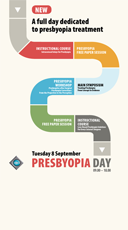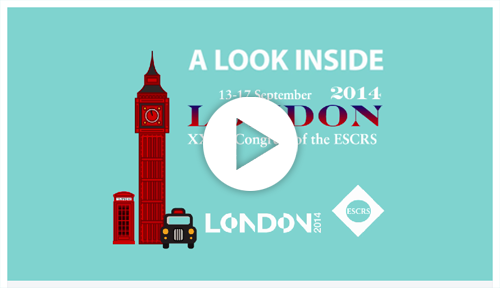Hyperopic-LASIK, multifocal IOL and laser enhancement: better to enhance subsequent myopia or hyperopia?
(results will display both Free Papers & Poster)
Session Details
Session Title: Presented Poster Session: Laser Refractive Surgery
Session Date/Time: Sunday 06/09/2015 | 15:00-16:30
Paper Time: 15:10
Venue: Poster Village: Pod 2
First Author: : R.Cobo-Soriano SPAIN
Co Author(s): : J. Baviera J. Ortega-Usobiaga J. Beltran
Abstract Details
Purpose:
RATIONALE: Presbyopia correction with multifocal IOLs in patients with previous LASIK will be a high-demanded procedure to maintain spectacle-independence with aging. IOL power calculation of post-keratorefractive eye is less predictable, refractive errors reduce efficacy of multifocal IOLs, so a second refractive enhancement may be needed. Moreover, decrease contrast sensitivity and dysphotic phenomena occur in both techniques, mainly in the post-hyperopic-LASIK eye.
Purpose:
To evaluate refractive and visual performance of eyes having a multifocal refractive-lens-exchange (RLE) with previous hyperopic lasik, and needed a subsequent photorefractive enhancement procedure (myopia/hyperopia), in order to choose the IOL that provide the best postoperative shift.
Setting:
Clinica Baviera Group, Madrid, Spain.
Methods:
Descriptive retrospective study evaluating refractive and visual outcomes of 67 eyes that had RLE with multifocal IOLs and had undergone a hyperopic LASIK procedure (spherical hyperopia, simple/compound hyperopic or mixed astigmatism) in our Institution (all preoperative data known), and required a new posterior refractive procedure (LASIK/PRK) to adjust a residual refractive defect. We compared the outcomes of the myopic-laser- enhancement group (n= 45) with the hyperopic/mixed-astigmatism laser-enhancement-group (n=22). Uncorrected distance visual acuity (UDVA), corrected distance visual acuity (CDVA) uncorrected near visual acuity (UNVA), efficacy, safety parameters and final predictability and residual refractive errors were analyzed.
Results:
The study evaluated 67 eyes of 54 patients. Lens surgery was performed after a mean time of 5.7±2.7 years since the primary LASIK procedure. In the myopic group there were 14 eyes (31%) that underwent more than one initial refractive procedures, whereas only one case (4.5%) in the hyperopic group. Regarding visual final outcomes (follow-up 2.3 years), no significant differences were found between groups: final mean UDVA and CDVA was 0.12 and 0.1 logMAR and 0.04 and 0.03 logMAR respectively for the myopic and hyperopic groups, and UNVA was J3.5, J3.4, and final mean postoperative spherical equivalent was +0.28 D and 0.00D respectively.
Conclusions:
A laser enhancement in eyes operated on with a multifocal spherical IOL with antecedent of a hyperopic lasik procedure was safe, effective, and predictable in both, myopic or hyperopic shift without statistically significant differences. A myopic shift after RLE was found in eyes that had more than one primary photorefractive procedures.
Financial Interest:
NONE





